Have you ever wanted to go back in time? To do things over? Do you ever lie awake at night recounting all the moments of shame in your life?
Or is that just me?
There is a difference between shame and regret. Perhaps it is a fine-grained distinction, but the latter applies more to what one has done, while the former pertains to who one is. This is the question central to shame.
Am I A Good Person?
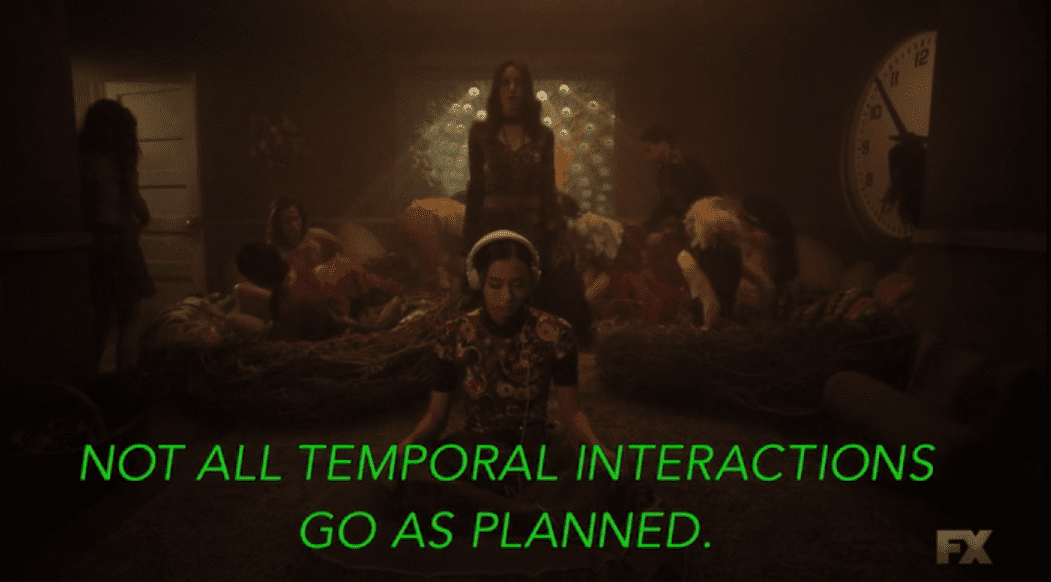
Thus David’s insistence that he is a good person. It is a denial of his own shame—which we clearly see that he feels when he talks to Syd, for example—and attempt to push back in the face of it. Thus he asks Switch:
Do you believe that I’m a good person? That I deserve love just like everybody else?
Here the question of desert is what needs to be called into question. Is it true that we deserve love? Is this the right concept?
I would contend that it is not.
To get at this, let’s start by distinguishing between excusing someone and forgiving them.
To excuse is to accept a justification: I understand why you did what you did in such a way as to determine it to have been an OK thing for you to do. In other words, I may not like what you have done, but if I excuse you it is because I have come to see how your action was warranted.
To forgive, on the other hand, involves no such structure of justification. I forgive you when I continue to view you as having been in the wrong, but absolve you anyway. Thus one should “never ruin an apology with an excuse” and so on.
It’s an important distinction. One can never say that someone should be forgiven insofar as “should” implies a warrant. Perhaps they should be excused, but it is the very way that forgiveness stands outside of the space of reasons that makes it an important concept. There is no reason to forgive someone, except, perhaps, love.
In this sense, to talk of deserving love is to conflate concepts that are truly distinct. One might deserve to be treated well, but not love—this, like forgiveness, stands outside of the order of reasons, or justification.
Do I Deserve Love?
There is no reason why we love those we do. This is why online dating, for example, is so frustrating. You can determine quite well that someone shares your interests and so on, and yet…the whole thing feels like approaching the issue backwards, and no matter how good of an argument you can present to yourself that you should love someone, you either do or you don’t, and when you do the way in which it transcends reason is precisely what makes it feel magical.
You take their interests on as your own, or something like that. Love is hard to describe. But when it is there for real, it transcends the self, and self-interest. It becomes as though the other is a part of oneself—their interests one’s own—and their perspective something that gains an equivalent weight.
Does David understand this? Syd doesn’t think so. This is why she tells him that he’s never really seen her. He’s never really loved her—“Don’t say ‘love each other’!”—but only viewed her through the perspective of his own interests and desires. She made him feel good. She made him feel loved. But he has always been caught up in himself.
Your mind can’t reconcile the person we see with the person you think you are. – Cary
It doesn’t matter what you did, it’s who you are, David, and all of this—your undoing project—it’s just another trick. – Syd
It is the manipulation that bothers Syd the most, and which should bother us the most as well. Take, for example, when David forces Lenny to be happy and hungry, or Squirrel’s fear when Clark shows him David’s picture. The latter is so afraid that he starts to sing “Jump” by Kriss Kross in an attempt to keep David out of his mind. And Cary is equally manipulated by the end of the episode into coming over to David’s side.
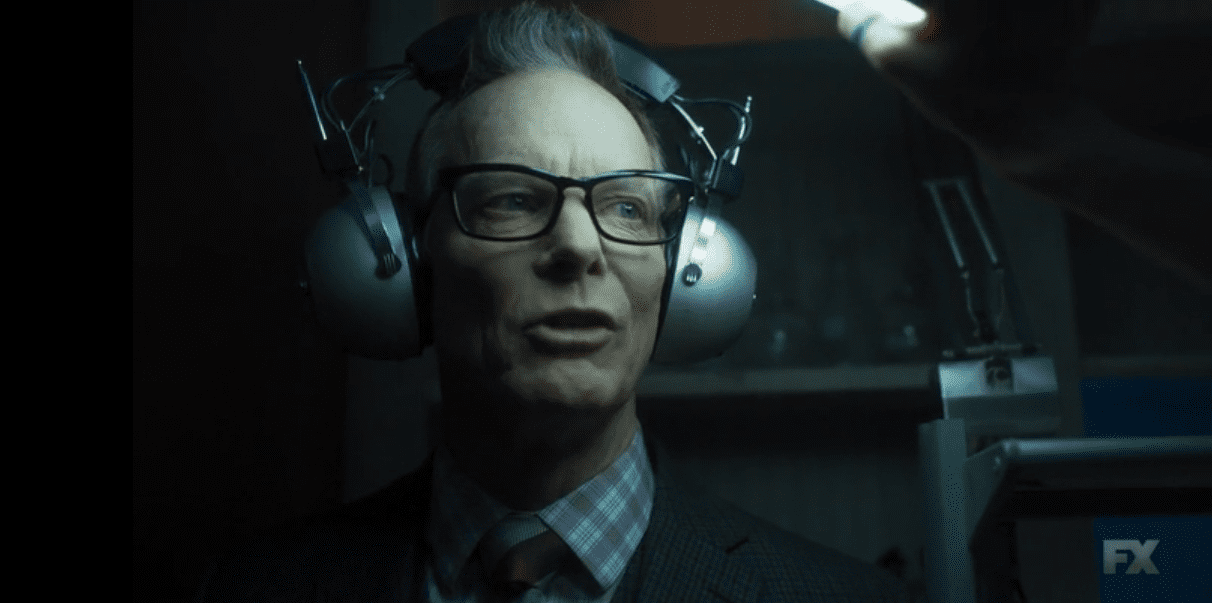
It is this violation of autonomy that is central to the immorality of David’s character at this point. Even if he makes people happy, he is doing so against their will, as we see with Lenny. He may tell Syd that he is helping people love one another, and themselves, but it is not love that he has to offer but something else.
The style of his commune, from the dress of those involved to its psychedelic elements, serves to symbolize this. Legion seems to be saying that the “free love” of the sexual revolution wasn’t love. It was but a simulacrum of it, fueled by shared drug experiences and the like.
This is not to say anything against having multiple sexual partners, or to insist that some traditional notion of monogamy is the only way to go (at least on my end), but only to point out that there is a reason for the aesthetic that Legion has chosen to deploy in Season 3. To love everyone is, at a certain level, to love no one, and there is an important difference between love and feeling groovy.
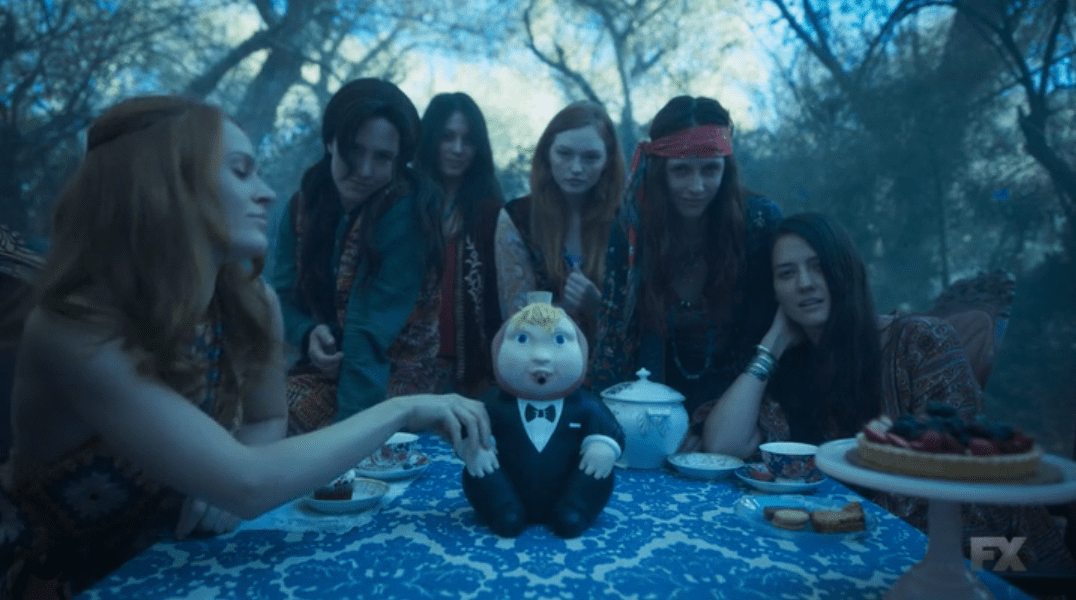
Yet David is not wrong when he talks to Syd about how we do things that we can’t take back and stop loving ourselves. She cuts him off before he can finish, because from his mouth this strikes her as a disingenuous schpiel (and perhaps it is), but the end of the point would be that we get caught in a cycle of shame and despair.
We lie awake at night, thinking about what we have done and who are and worrying: am I good person? Do I deserve love?
Of course, I have already argued that love is not about desert, but something else. Shame doesn’t know this, however. It presents the desire to go back and fix things, to start over. If only I could travel to the past and change things, I could save the (my) world.
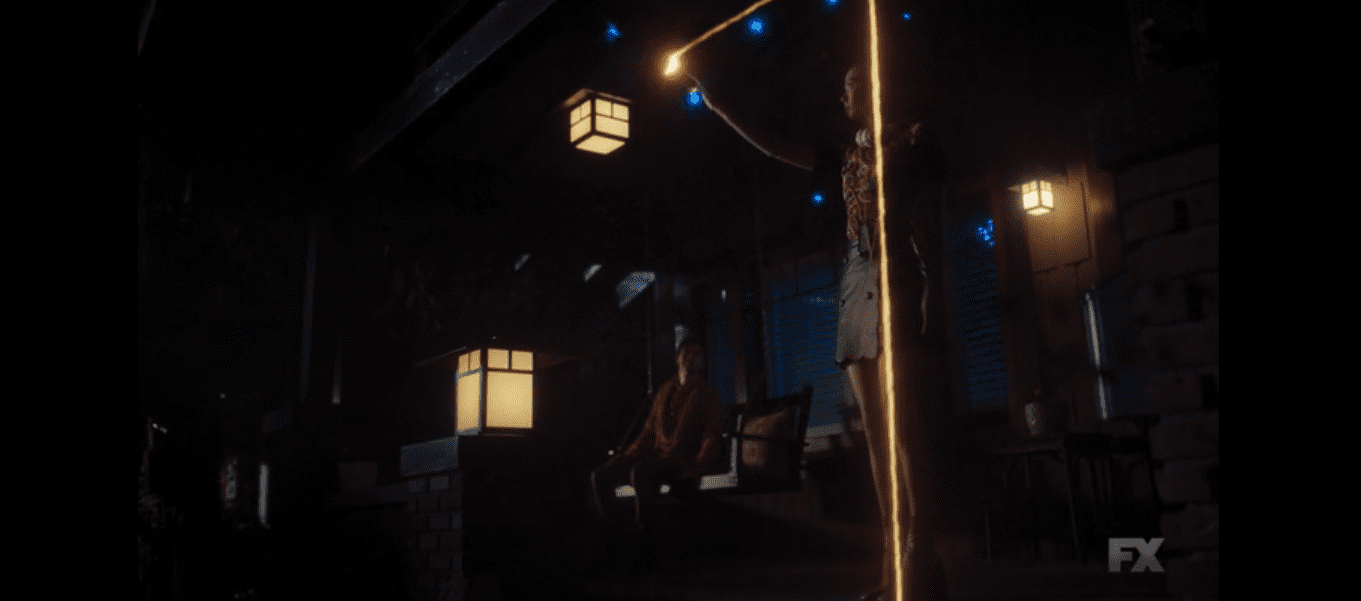
Will David End the World?
On the one hand, as I pointed out last week, the idea that David remains bound to end the world in light of the events at the end of Season 2 is highly questionable. Even if we presume that he would have in a timeline wherein he killed Farouk (which is questionable in a different way), that is not what has happened. Farouk lives, and though Syd and the others seem to be convinced that they need him to stop David, this very difference (between Farouk living and dying) is rather massive.
That is, the course of events in a timeline where David killed Farouk would presumably be very different from what we are seeing in Season 3. Would he have left Division and gone off to start a cult? I suppose it is not impossible, but the path that led to this could not have been the same.
As such, Syd’s certainty that he remains a threat to existence in the face of what he says about leaving everyone alone truly does not seem to be warranted. If David is caught in a cycle of shame, she seems to be caught in one of resentment, where the possibility for forgiveness, or redemption, has been foreclosed.
Of course, prior to Season 3, as I wondered whether Legion knew what it was doing with its narrative, I contended that David had become irredeemable. I now want to clarify that point in light of the distinctions I made above, as I overstated the case or fell prey to the same kind of conceptual confusion I suggested that David does in wondering about whether he “deserves love.”
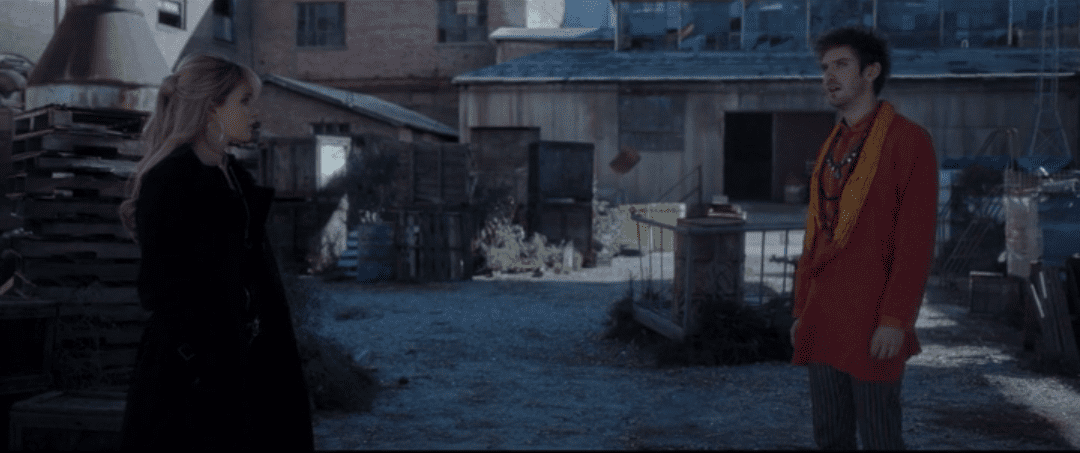
What About Forgiveness?
What David has done is inexcusable. There is no justification available. But can he be forgiven?
He certainly doesn’t deserve it, as the whole notion of desert is out of place here. And, further, his behavior so far in Season 3 takes him farther away as opposed to closer to being excused. He is caught in a cycle of shame, with its desire to undo the past. He thinks that if only he can manage to do the right thing, or say the right words, he can fix the (his) world.
This is something, however, that many of us can relate to. Think of any time you’ve fucked things up in a relationship, for example. (If you haven’t done this, well, good on you I guess.) It doesn’t have to be some big thing we’re talking about here—it could be something rather small in the grand scheme of things. The important thing is for it to be some instance where it’s not just some action in question, like leaving a jar of peanut butter open on the counter, but something that cuts deeper to a worry about who you are—some moment that you can’t take back or make right. It’s just going to sit there.
Say, for example—to try and make things concrete—you sent a text message that you really wish you hadn’t: maybe a declaration of love to a friend you have a crush on, or something like that. You can’t take it back, but you can’t really apologize either; it’s not that sort of thing. Yet, you have changed the nature of the relationship with your friend. You might flail to try and walk it back, but it’s not going to work. Potentially, you’re just going to dig yourself a bigger hole. The only way out is for them to say it’s fine. Let’s forget about it and move on.
Of course what David did to Syd is far worse than that. You might even think that my text message example is so small that it doesn’t constitute a wrong done. But that was sort of the point of it: to distinguish again between regret and shame.
I can apologize for wronging you, but to do so for who I am just doesn’t quite work. And Syd makes it clear that this is the problem when she and David talk in this episode: he wants to apologize for what he did, but this meaningfully misses the point.
It is not that he had sex with her after he altered her mind—it is not the sex act, as it were, that is—it is the judgment of his character she made even before that, and his attempt to wipe it that puts him beyond the pale. So when he offers to go back and change things, he still fails to see her, and how it is the fact that he manipulated her that represents the real betrayal of trust more than anything.
What about trust?
– I tried that; it’s better to read people’s minds.
Of course the sex was not nothing for Syd. All I am trying to suggest is that it is more symbolic of his violation for her than the most important thing itself.
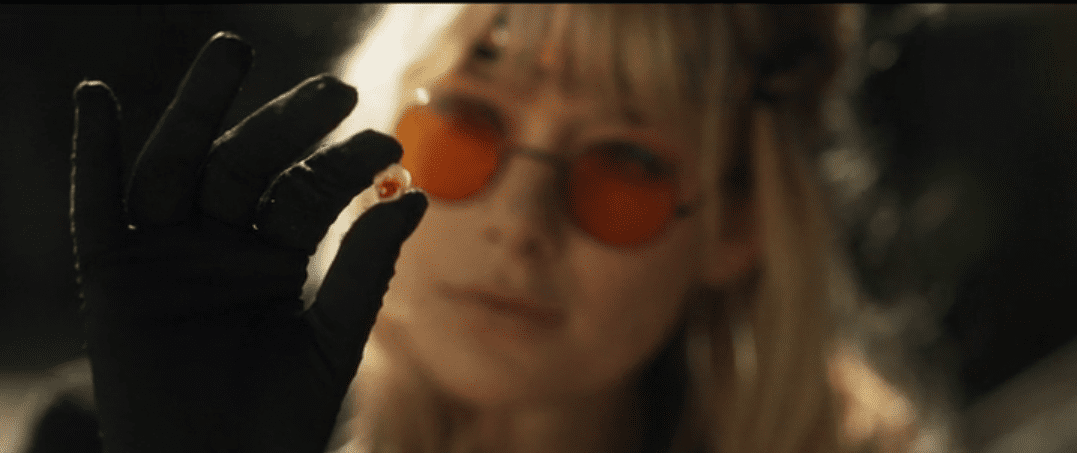
Though this thought is thrown into an interesting tension as she interacts with Farouk in this episode.
After asking how you can surprise someone who can go back in time and warn himself, Farouk posits that perhaps a lover could do what an army could not. Syd says she won’t do that.
To save the world?
– Gross
But as Farouk moves to suggest that the intimacy they need is not physical, but emotional, and that he will teach Syd to lie so well that David thanks her when she stabs him in the back, Syd seems to be potentially open it.
Her cycle of resentment is leading her to think she might be justified in the same kind of moral wrong that David inflicted upon her: to manipulate and trick him.
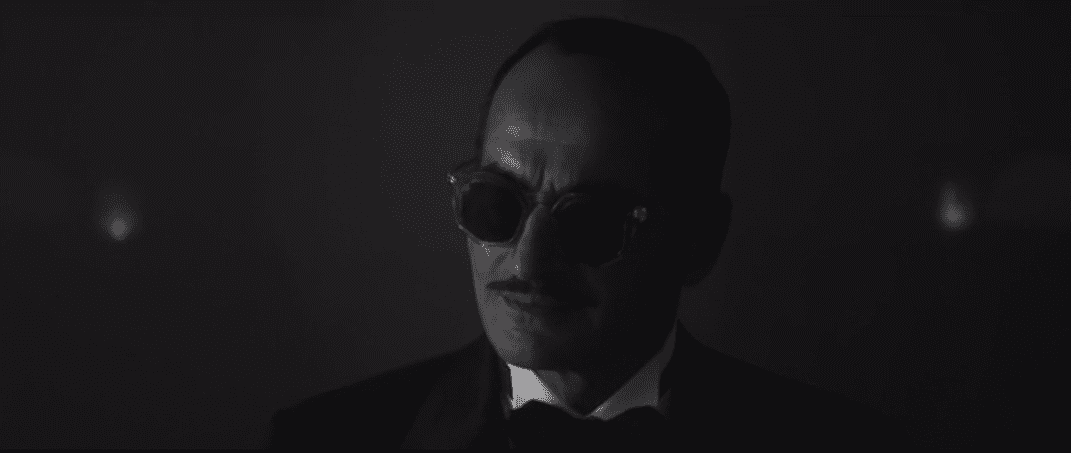
To Save the World?
Well, again, the notion that David remains a threat seems under-motivated from the point of view of what Syd knows and what has already happened to alter the (supposedly) original timeline. But from another point of view—that of the viewer—the worry seems very real.
David has told us—or Switch—that his goal is not simply about fixing things with the girl (Syd), but to save the world. He has implied that this means he wants to go back and stop things with The Night King before they started (or at least before they started with him), and that tracks with the knowledge that Charles Xavier will appear in this season.
But, then, we have also had Switch’s tapes (which I, like Lenny thought were in Japanese—sorry!) tell us that going too far back into the past can risk awakening “the demon.” That’s intriguing.
So it does seem possible to me that David’s plan will/would destroy the world, as he goes back into the past to try and start things over (always a fool’s errand), awakens the demon, and wrecks spacetime, or something like that.
But what about Farouk? Could he be that demon in question? The Devil with Yellow Eyes?
I doubt it, but I still don’t trust him and am concerned at the extent to which the forces of Division seem to. He’s a trickster, perhaps even more so than David, and we have seen that over the course of the show.
And who’s left as the moral center of Division? Ptonomy has become the mainframe. Melanie and Oliver are I guess drinking martinis and listening to jazz in some place outside of time and space. Clark has always been questionable. Cary and Kerry have always been more like tools (no offense) than parts of the decision-making core, and at least one of them is now with David.
That leaves Syd, whose judgment has been clouded by her own cycle of resentment, and Farouk…
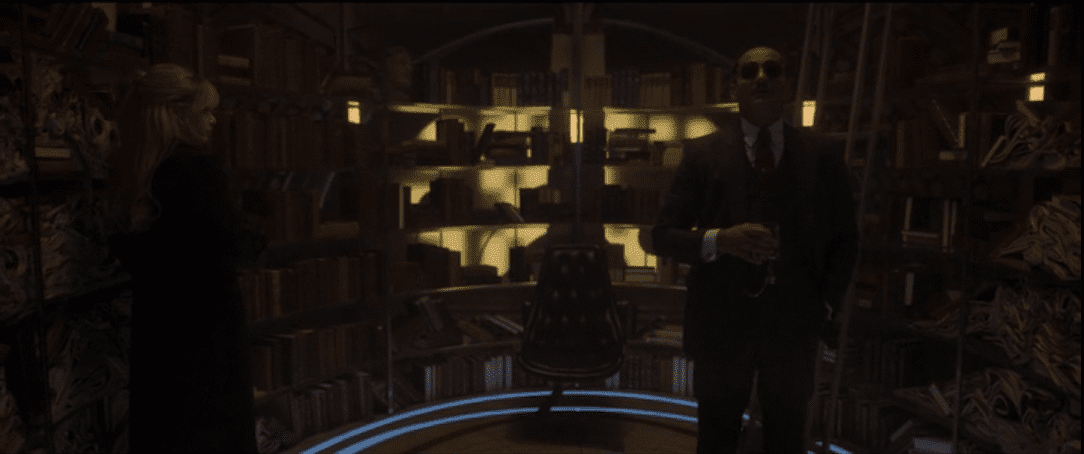
David is not a good person. He does not deserve love, because “deserve” is the wrong term.
But perhaps none of them are good people at this point.
Maybe Switch? She does not seem to have been manipulated like Squirrel (poor Squirrel!) and the others in David’s camp, but why exactly is she helping him? If there is not a bit more to this story, I will be disappointed.
Can we forgive David, anyway? I think this whole episode has a way of moving in that direction, as all of the supernatural-type stuff plays as an allegory for the very real-world problems of grappling with shame and resentment.
He wants to go back and “fix” the past, and even if that is misguided because it is impossible; even if the impossibility of it means that he will indeed threaten the world itself; even if he is beyond redemption as he manipulates those who follow him to do so despite their will, his motivation—stemming from shame as it does—is all too understandable.
Vagrant Questions
- What is up with the tooth? We saw Syd pick it up in Episode 1, and her holding it again here in Episode 2. It seems clear that it is Switch’s tooth (I think?) given the way we saw her playing with her tooth in Episode 1, but I’m still not sure I get it. Am I missing something, or does this remain a mystery for all of us?
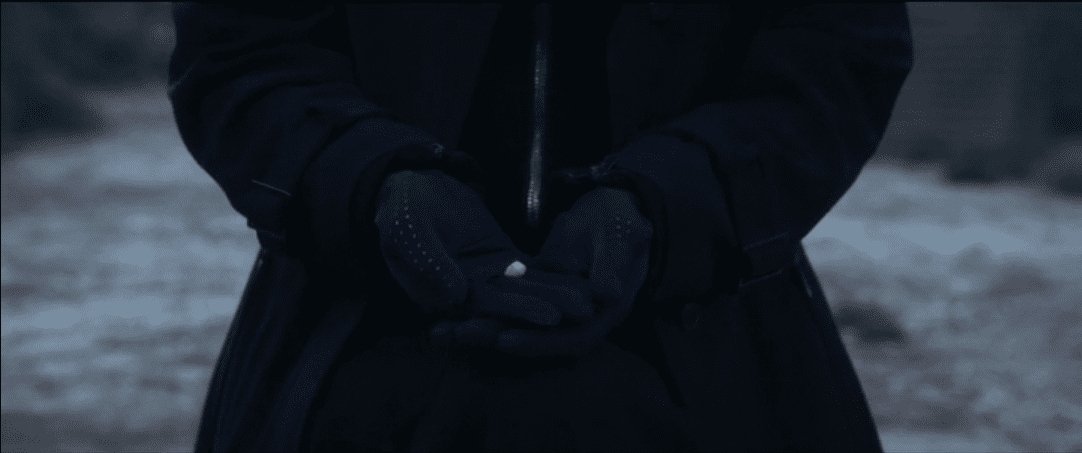
- Does Kerry join Cary towards the end of the episode, or was that just David tricking him into thinking that she was there?
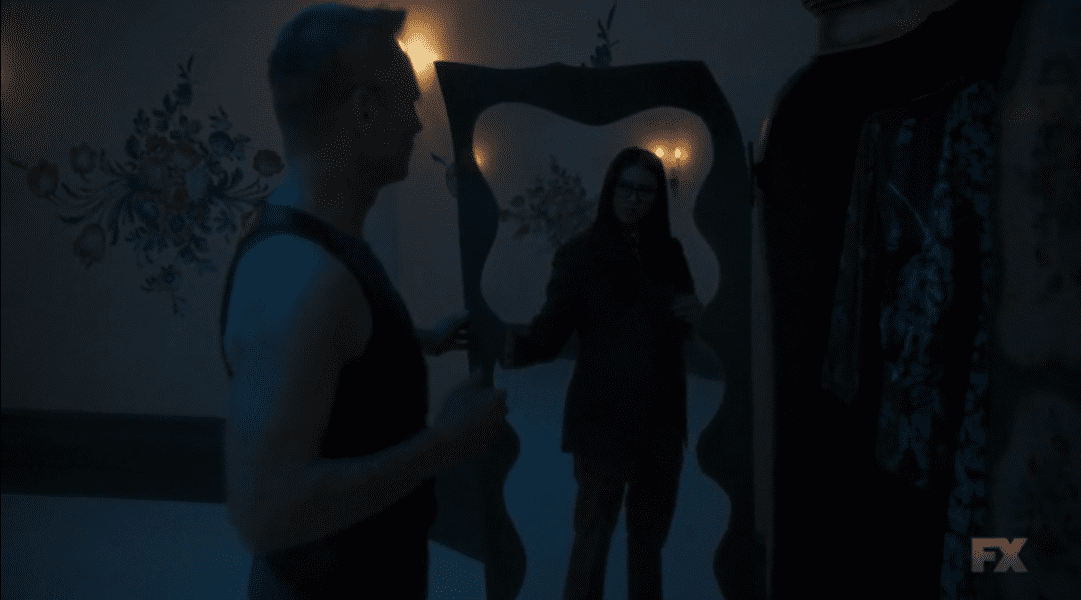
- What’s up with the giant pig?
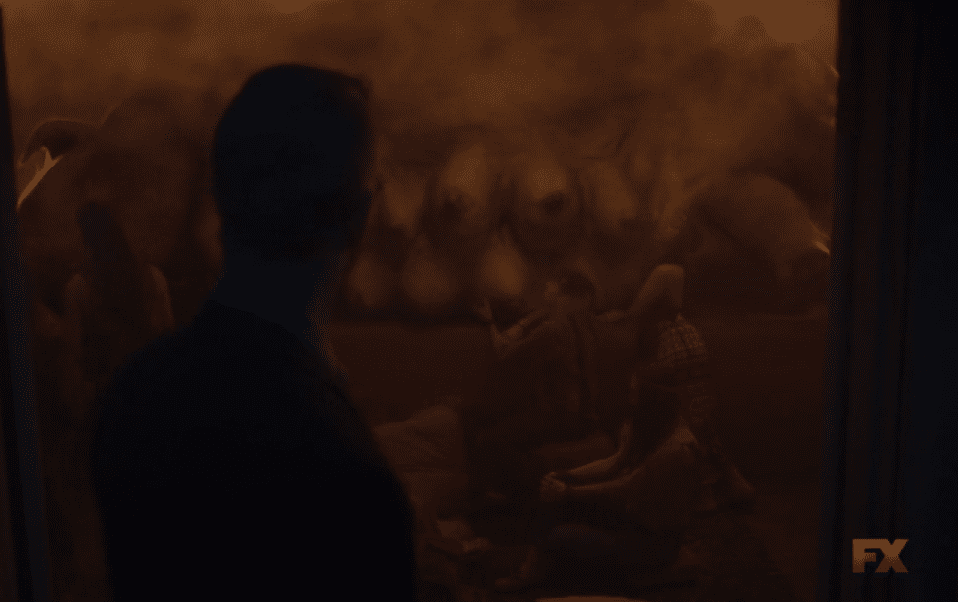
- Is the gas/drug important to David’s mind control? It seems like it, with regard to what happens to Cary, but how does this work? Isn’t he powerful enough without it? Plus those cult members in that scene where Lenny is like the Mad Hatter seemed to be perfectly under control…but then in the other scene after his talk with Syd the way David got angry seemed to upset his followers through the gas…so, basically, what’s up with the gas?
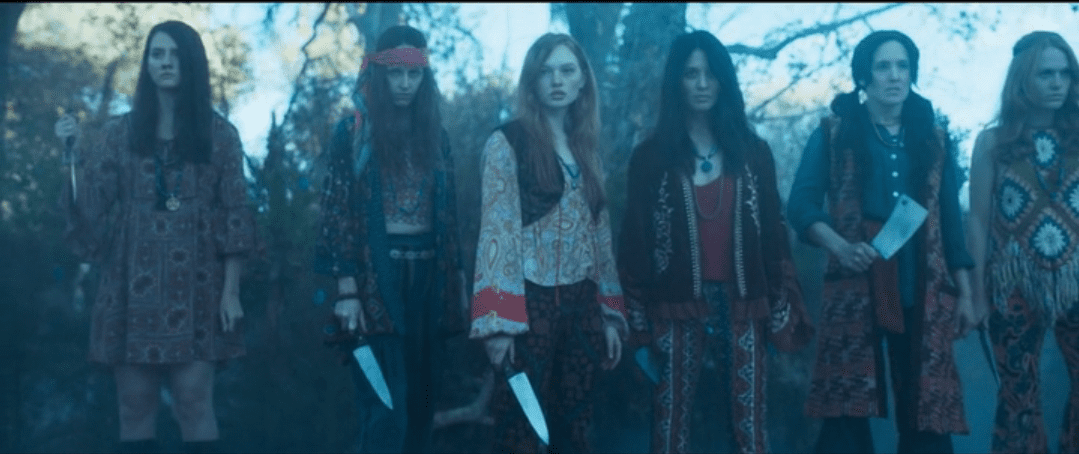
- On a related note, is Squirrel OK? Because I love that guy and really hope so. But he got the red instead of the blue drugs, and seemed to really freak out. Here’s hoping he has the chance to sing more Kriss Kross lyrics.
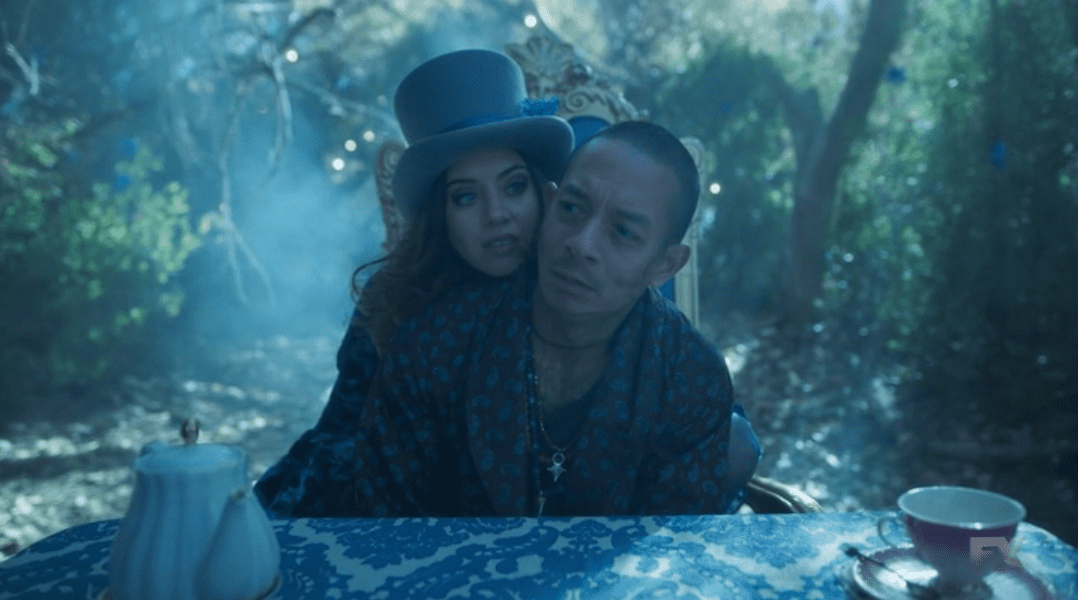
- Wasn’t Cary’s psyche-out to escape the room towards the end of the episode amazing and hilarious? I could watch that all day…
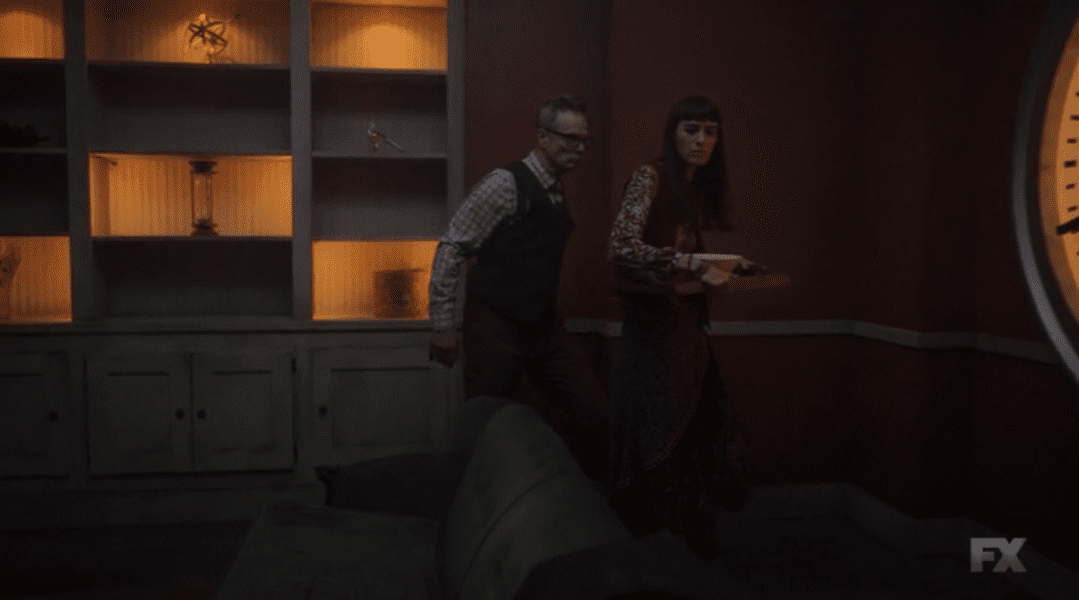
What did you think of this week’s episode? Let us know in the comments and stay tuned for next week!

